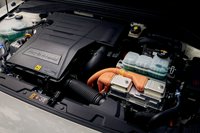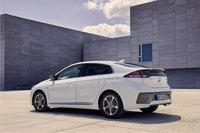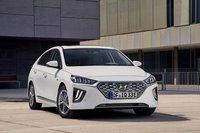Hyundai IONIQ facelift
Compact HatchbackProduct Gallery






Product Overview
Hyundai IONIQ facelift is a compact hatchback in production from 2019 to 2022. It was powered by a hybrid drivetrain, a plug-in hybrid drivetrain, and a battery-electric drivetrain. This makes it similar in product strategy to the Honda Clarity, though the Honda boasts a more revolutionary fuel-cell option.
Overall, the IONIQ is rather ugly and uninspiring. It is a good choice only for those who want to spend less on cars.
Ratings
What we found
Neofiliac score 20%
Pros
- Low official fuel consumption
Cons
- Horrible 0-100kph time
- Can't even reach 200km/h
- Miserably low engine output
- Poor handling
What external reviewers found
External score 58%
Pros
- Good infotainment system
- Excellent tech
- Good fuel economy
- Decent range
Cons
- Lacklustre powertrain
- Lackluster infotainment system
- Lackluster infotainment
- Lacklustre interior
- Lack of front and rear parking sensors
- Lack of EV-only range
Your rating:
12345678910
?/10
Price Comparison
As associates of the merchants above, we earn a commission when you make a purchase using the supplied links.
Specifications
[[{"Ft":"Capacity","Fn":"Cargo Capacity","Fv":"357 L / 12.6 cu-ft ~ 1417 L / 50.0 cu-ft"},{"Ft":"Capacity","Fn":"Coolant Capacity","Fv":"6.7 L / 7.1 qt"},{"Ft":"Capacity","Fn":"Engine Oil Capacity","Fv":"3.8 L / 4.0 qt"},{"Ft":"Capacity","Fn":"Passengers","Fv":"5"},{"Ft":"Capacity","Fn":"Payload","Fv":"395 kg / 871 lbs"},{"Ft":"Chassis","Fn":"Brakes | Front","Fv":"Ventilated discs, 280 mm"},{"Ft":"Chassis","Fn":"Brakes | Rear","Fv":"Disc, 284 mm"},{"Ft":"Chassis","Fn":"Power Steering","Fv":"Electric Steering"},{"Ft":"Chassis","Fn":"Suspension | Front","Fv":"MacPherson strut"},{"Ft":"Chassis","Fn":"Suspension | Rear","Fv":"Torsion"},{"Ft":"Chassis","Fn":"Tire Size","Fv":"205/60 R16"},{"Ft":"Chassis","Fn":"Turning Circle","Fv":"10.6 m / 34.8 ft"},{"Ft":"Construction","Fn":"Battery | Capacity","Fv":"40.4 kWh (gross) | 38.3 kWh (net)"},{"Ft":"Construction","Fn":"Battery | Type","Fv":"Lithium-polymer"},{"Ft":"Construction","Fn":"Battery | Voltage","Fv":"319.4 V"},{"Ft":"Construction","Fn":"Body Style","Fv":"5-door battery-electric Sedan"},{"Ft":"Dimensions","Fn":"Ground Clearance","Fv":"150 mm / 5.9 in"},{"Ft":"Dimensions","Fn":"Size | Height","Fv":"1475 mm / 58.1 in"},{"Ft":"Dimensions","Fn":"Size | Length","Fv":"4470 mm / 176.0 in"},{"Ft":"Dimensions","Fn":"Size | Width","Fv":"1820 mm / 71.7 in | 2045 mm / 80.5 in (mirror unfolded)"},{"Ft":"Dimensions","Fn":"Track Width | Front","Fv":"1555.0 mm / 61.2 in"},{"Ft":"Dimensions","Fn":"Track Width | Rear","Fv":"1564.0 mm / 61.6 in"},{"Ft":"Dimensions","Fn":"Weight","Fv":"1527.0 kg / 3366.5 lbs"},{"Ft":"Dimensions","Fn":"Wheel Size","Fv":"6.5J x 16"},{"Ft":"Dimensions","Fn":"Wheelbase","Fv":"2700 mm / 106.3 in"},{"Ft":"Performance","Fn":"Acceleration | 0 - 100 km/h","Fv":"9.9 sec"},{"Ft":"Performance","Fn":"Acceleration | 0 - 60 mph","Fv":"9.4 sec"},{"Ft":"Performance","Fn":"CO2 Emission","Fv":"26 g/km"},{"Ft":"Performance","Fn":"Electric Range","Fv":"311.0 km / 193.2 mi"},{"Ft":"Performance","Fn":"Top Speed","Fv":"165.0 km/h / 102.5 mph"},{"Ft":"Performance","Fn":"Towing Capacity","Fv":"750 kg / 1653 lbs (w/ brakes @ 12% gradient)"},{"Ft":"Powertrain","Fn":"Drivetrain Layout","Fv":"Front-engine (transverse), Front-wheel drive"},{"Ft":"Powertrain","Fn":"Engine | Bore","Fv":"72.0 mm / 2.8 in"},{"Ft":"Powertrain","Fn":"Engine | Compression Ratio","Fv":"13.0:1"},{"Ft":"Powertrain","Fn":"Engine | Displacement","Fv":"1.6 L / 96.4 cu-in / 1580.0 cc"},{"Ft":"Powertrain","Fn":"Engine | Power","Fv":"136 hp / 101.4 kW"},{"Ft":"Powertrain","Fn":"Engine | Specific Output","Fv":"66.5 hp/L / 1.1 hp/cu-in"},{"Ft":"Powertrain","Fn":"Engine | Stroke","Fv":"97.0 mm / 3.8 in"},{"Ft":"Powertrain","Fn":"Engine | Torque","Fv":"147 Nm / 108.4 lb-ft @ 4000 rpm + 170 Nm / 125.4 lb-ft"},{"Ft":"Powertrain","Fn":"Transmission | Gears","Fv":"1-speed"},{"Ft":"Powertrain","Fn":"Transmission | Type","Fv":"Automatic"},{"Ft":"Production","Fn":"Availability","Fv":"2019"}],[{"Ft":"Capacity","Fn":"Cargo Capacity","Fv":"443 L / 15.6 cu-ft ~ 1505 L / 53.1 cu-ft"},{"Ft":"Capacity","Fn":"Coolant Capacity","Fv":"6.7 L / 7.1 qt"},{"Ft":"Capacity","Fn":"Engine Oil Capacity","Fv":"3.8 L / 4.0 qt"},{"Ft":"Capacity","Fn":"Fuel Capacity","Fv":"45.0 L / 11.9 gal"},{"Ft":"Capacity","Fn":"Passengers","Fv":"5"},{"Ft":"Capacity","Fn":"Payload","Fv":"401 kg / 884 lbs"},{"Ft":"Chassis","Fn":"Brakes | Front","Fv":"Disc"},{"Ft":"Chassis","Fn":"Brakes | Rear","Fv":"Disc"},{"Ft":"Chassis","Fn":"Power Steering","Fv":"Electric Steering"},{"Ft":"Chassis","Fn":"Suspension | Front","Fv":"MacPherson strut"},{"Ft":"Chassis","Fn":"Suspension | Rear","Fv":"Multi-link"},{"Ft":"Chassis","Fn":"Tire Size","Fv":"195/65 R15, 225/45 R17"},{"Ft":"Chassis","Fn":"Turning Circle","Fv":"10.6 m / 34.8 ft"},{"Ft":"Construction","Fn":"Battery | Capacity","Fv":"1.6 kWh (gross)"},{"Ft":"Construction","Fn":"Battery | Type","Fv":"Lithium-polymer"},{"Ft":"Construction","Fn":"Battery | Voltage","Fv":"360.0 V"},{"Ft":"Construction","Fn":"Body Style","Fv":"5-door hybrid Sedan"},{"Ft":"Dimensions","Fn":"Ground Clearance","Fv":"140 mm / 5.5 in"},{"Ft":"Dimensions","Fn":"Size | Height","Fv":"1450 mm / 57.1 in"},{"Ft":"Dimensions","Fn":"Size | Length","Fv":"4470 mm / 176.0 in"},{"Ft":"Dimensions","Fn":"Size | Width","Fv":"1820 mm / 71.7 in | 2045 mm / 80.5 in (mirror unfolded)"},{"Ft":"Dimensions","Fn":"Track Width | Front","Fv":"1549.0 mm / 61.0 in"},{"Ft":"Dimensions","Fn":"Track Width | Rear","Fv":"1563.0 mm / 61.5 in"},{"Ft":"Dimensions","Fn":"Weight","Fv":"1469.0 kg / 3238.6 lbs"},{"Ft":"Dimensions","Fn":"Wheel Size","Fv":"6J x 15, 7J x 17"},{"Ft":"Dimensions","Fn":"Wheelbase","Fv":"2700 mm / 106.3 in"},{"Ft":"Performance","Fn":"Acceleration | 0 - 100 km/h","Fv":"10.8 sec"},{"Ft":"Performance","Fn":"Acceleration | 0 - 60 mph","Fv":"10.3 sec"},{"Ft":"Performance","Fn":"CO2 Emission","Fv":"26 g/km"},{"Ft":"Performance","Fn":"Electric Range","Fv":"311.0 km / 193.2 mi"},{"Ft":"Performance","Fn":"Top Speed","Fv":"185.0 km/h / 115.0 mph"},{"Ft":"Performance","Fn":"Towing Capacity","Fv":"750 kg / 1653 lbs (w/ brakes @ 12% gradient)"},{"Ft":"Powertrain","Fn":"Drivetrain Layout","Fv":"Front-wheel drive"},{"Ft":"Powertrain","Fn":"Engine | Bore","Fv":"72.0 mm / 2.8 in"},{"Ft":"Powertrain","Fn":"Engine | Compression Ratio","Fv":"13.0:1"},{"Ft":"Powertrain","Fn":"Engine | Displacement","Fv":"1.6 L / 96.4 cu-in / 1580.0 cc"},{"Ft":"Powertrain","Fn":"Engine | Power","Fv":"105.0 hp / 78.3 kW @ 5700 rpm + 44.0 hp / 32.8 kW (electric motor)"},{"Ft":"Powertrain","Fn":"Engine | Specific Output","Fv":"66.5 hp/L / 1.1 hp/cu-in"},{"Ft":"Powertrain","Fn":"Engine | Stroke","Fv":"97.0 mm / 3.8 in"},{"Ft":"Powertrain","Fn":"Engine | Torque","Fv":"147 Nm / 108.4 lb-ft @ 4000 rpm + 170 Nm / 125.4 lb-ft"},{"Ft":"Powertrain","Fn":"Engine | Type","Fv":"petrol inline-4 DOHC engine with 4 values per cylinder"},{"Ft":"Powertrain","Fn":"Transmission | Gears","Fv":"6-speed"},{"Ft":"Powertrain","Fn":"Transmission | Type","Fv":"Double clutch transmission (DCT)"},{"Ft":"Production","Fn":"Availability","Fv":"2019"}],[{"Ft":"Capacity","Fn":"Cargo Capacity","Fv":"341 L / 12.0 cu-ft ~ 1401 L / 49.5 cu-ft"},{"Ft":"Capacity","Fn":"Coolant Capacity","Fv":"6.7 L / 7.1 qt"},{"Ft":"Capacity","Fn":"Engine Oil Capacity","Fv":"3.8 L / 4.0 qt"},{"Ft":"Capacity","Fn":"Fuel Capacity","Fv":"43.0 L / 11.4 gal"},{"Ft":"Capacity","Fn":"Passengers","Fv":"5"},{"Ft":"Capacity","Fn":"Payload","Fv":"419 kg / 924 lbs"},{"Ft":"Chassis","Fn":"Brakes | Front","Fv":"Disc"},{"Ft":"Chassis","Fn":"Brakes | Rear","Fv":"Disc"},{"Ft":"Chassis","Fn":"Power Steering","Fv":"Electric Steering"},{"Ft":"Chassis","Fn":"Suspension | Front","Fv":"MacPherson strut"},{"Ft":"Chassis","Fn":"Suspension | Rear","Fv":"Multi-link"},{"Ft":"Chassis","Fn":"Tire Size","Fv":"205/55 R16"},{"Ft":"Chassis","Fn":"Turning Circle","Fv":"10.6 m / 34.8 ft"},{"Ft":"Construction","Fn":"Battery | Capacity","Fv":"8.9 kWh (gross) | 7.1 kWh (net)"},{"Ft":"Construction","Fn":"Battery | Type","Fv":"Lithium-polymer"},{"Ft":"Construction","Fn":"Battery | Voltage","Fv":"360.0 V"},{"Ft":"Construction","Fn":"Body Style","Fv":"5-door plug-in hybrid Sedan"},{"Ft":"Dimensions","Fn":"Ground Clearance","Fv":"140 mm / 5.5 in"},{"Ft":"Dimensions","Fn":"Size | Height","Fv":"1450 mm / 57.1 in"},{"Ft":"Dimensions","Fn":"Size | Length","Fv":"4470 mm / 176.0 in"},{"Ft":"Dimensions","Fn":"Size | Width","Fv":"1820 mm / 71.7 in | 2045 mm / 80.5 in (mirror unfolded)"},{"Ft":"Dimensions","Fn":"Track Width | Front","Fv":"1555.0 mm / 61.2 in"},{"Ft":"Dimensions","Fn":"Track Width | Rear","Fv":"1569.0 mm / 61.8 in"},{"Ft":"Dimensions","Fn":"Weight","Fv":"1495.0 kg / 3295.9 lbs"},{"Ft":"Dimensions","Fn":"Wheel Size","Fv":"6.5J x 16"},{"Ft":"Dimensions","Fn":"Wheelbase","Fv":"2700 mm / 106.3 in"},{"Ft":"Performance","Fn":"Acceleration | 0 - 100 km/h","Fv":"10.6 sec"},{"Ft":"Performance","Fn":"Acceleration | 0 - 60 mph","Fv":"10.1 sec"},{"Ft":"Performance","Fn":"CO2 Emission","Fv":"26 g/km"},{"Ft":"Performance","Fn":"Electric Range","Fv":"311.0 km / 193.2 mi"},{"Ft":"Performance","Fn":"Top Speed","Fv":"178.0 km/h / 110.6 mph"},{"Ft":"Performance","Fn":"Towing Capacity","Fv":"750 kg / 1653 lbs (w/ brakes @ 12% gradient)"},{"Ft":"Powertrain","Fn":"Drivetrain Layout","Fv":"Front-engine (transverse), Front-wheel drive"},{"Ft":"Powertrain","Fn":"Engine | Bore","Fv":"72.0 mm / 2.8 in"},{"Ft":"Powertrain","Fn":"Engine | Compression Ratio","Fv":"13.0:1"},{"Ft":"Powertrain","Fn":"Engine | Displacement","Fv":"1.6 L / 96.4 cu-in / 1580.0 cc"},{"Ft":"Powertrain","Fn":"Engine | Power","Fv":"105.0 hp / 78.3 kW @ 5700 rpm + 61.0 hp / 45.5 kW (electric motor)"},{"Ft":"Powertrain","Fn":"Engine | Specific Output","Fv":"66.5 hp/L / 1.1 hp/cu-in"},{"Ft":"Powertrain","Fn":"Engine | Stroke","Fv":"97.0 mm / 3.8 in"},{"Ft":"Powertrain","Fn":"Engine | Torque","Fv":"147 Nm / 108.4 lb-ft @ 4000 rpm + 170 Nm / 125.4 lb-ft"},{"Ft":"Powertrain","Fn":"Engine | Type","Fv":"Naturally-aspirated direct-injected petrol inline-4 DOHC engine with 4 values per cylinder"},{"Ft":"Powertrain","Fn":"Transmission | Gears","Fv":"6-speed"},{"Ft":"Powertrain","Fn":"Transmission | Type","Fv":"Double clutch transmission (DCT)"},{"Ft":"Production","Fn":"Availability","Fv":"2019"}]]
| Electric | Hybrid | Plug-in Hybrid |
|---|
External Reviews
autocar[1]
Reviewer score 55% (normalized by Neofiliac)The Ioniq Electric’s battery has been boosted to 38kWh, up from 28kWh. The permanent magnet electric motor driving the front wheels has been exchanged for a more efficient version. The combination has helped extend range more than 30% over the old car. A newly-fitted 7.2kW onboard charger can charge the battery to 80% in 57 minutes on a 50kW charger, or from flat to full in little over six hours.
Pros
- Uprated powertrain
- Decent range
- Improved infotainment
Cons
- Slightly heavier than the outgoing model
autoexpress[2]
Reviewer score 64% (normalized by Neofiliac)Hyundai's first attempt at a full-on eco car family is a strong one. The Ioniq comes in hybrid, plug-in and full electric forms. All three offer plenty of practicality at an affordable price with lots of kit. However, the electric motor and petrol engine in the hybrid variants aren't integrated as well as in the Toyota Prius, and the car isn't as comfortable, either.
Pros
- Cheaper than Prius
- Lots of standard equipment
Cons
- Alternatives offer more practicality
- Not as comfortable as Prius
cnet[3]
Reviewer score 61% (normalized by Neofiliac)Hyundai's Ioniq is no performance car by any stretch of the imagination, but it never feels underpowered. Power is sent to the front wheels via a six-speed, dual-clutch gearbox. It's the most efficient non-plug-in vehicle available in the US, with an EPA rating of up to 58 miles per gallon.
Pros
- Excellent fuel economy
- Comfortable, quiet cabin
- Excellent tech
Cons
- Dull interior
- Lackluster infotainment system
pcmag[4]
Reviewer score 67% (normalized by Neofiliac)The 2020 Ioniq PHEV uses the same basic UX that's been in Hyundai vehicles for about a decade. The dashboard has been redesigned so that the climate controls are now located on a new glossy black panel. Infotainment connectivity also hasn't changed since it's all through Android Auto and Apple CarPlay.
Pros
- Powerful six-speed automatic transmission
- Good fuel economy
Cons
- Lack of EV-only range
- Lackluster infotainment
Also Check
References
<
>
x